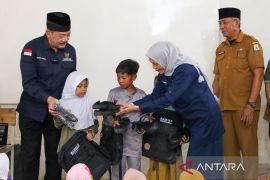The US government shutdown has stopped President Barack Obama from attending the APEC summit in Indonesia, worrying US allies at a time when China is on the rise and Washington is trying to push through an ambitious 12-nation trade pact.Nusa Dua, Indonesia (ANTARA News/ AFP) - Asia-Pacific leaders convene on Monday for an annual economic summit in the shadow of global growth clouds that are darkening by the day as the United States struggles to shake off policy paralysis.
The US government shutdown has stopped President Barack Obama from attending the Asia-Pacific Economic Cooperation (APEC) summit in Indonesia, worrying US allies at a time when China is on the rise and Washington is trying to push through an ambitious 12-nation trade pact.
Obama`s enforced absence at both APEC and an East Asia summit straight afterwards in Brunei leaves the stage clear for Chinese President Xi Jinping, who has been touring the region and will address a parallel meeting of APEC business leaders on Monday.
According to APEC`s Indonesian hosts, the title of Xi`s speech is "China in transition: what can the Asia-Pacific expect?"
Some expect an economic bonanza. Others, looking nervously at Beijing`s territorial claims, expect a more restive region and want reassurance from Washington.
But the United States may be ill-equipped to offer much immediate global leadership as it confronts a mightier menace than even the shutdown: the possibility that it might default on its colossal debts unless Congress raises the federal borrowing limit by October 17.
All that is taking place at a moment when, according to a statement by APEC foreign and trade ministers issued on Saturday, the world economy can ill-afford more uncertainty following the 2008 financial crisis.
They said that "global growth is too weak, risks remain tilted to the downside, and the economic outlook suggests growth is likely to be slower and less balanced than desired".
In a preview of the summit declaration to be released on Tuesday, the ministers stressed their backing for a "comprehensive series of structural reforms so to increase productivity, labour force participation and high-quality job creation".
For Obama, comprehensive economic reform would include agreement on the Trans-Pacific Partnership (TPP) by the end of the year. He was meant to convene the TPP countries for a decisive round of talks on the APEC sidelines on Tuesday.
But the US delegation, while led by Secretary of State John Kerry, is now shorn of presidential lustre and doubts about the TPP are gathering pace.
The perennial disputes that hobble all trade agreements, such as market access and protection of intellectual property, are rearing anew in the TPP negotiations and Malaysia sees the end-of-year deadline as "very tight".
China is not party to the TPP and is instead pushing ahead with a rival mega-trade pact grouping 16 countries in the region, potentially opening up a new front in the struggle between the world powers for strategic dominance of the Asia-Pacific.
At the level of APEC, which spans the Pacific from East Asia and Australia to the United States and Mexico, the 21 members have settled for a more distant time-frame of 2020 for a non-binding series of trade goals that have failed to make much headway at successive summits.
Harmony will break out on Tuesday, however, when all the leaders -- minus Obama -- don national garb of the host country for APEC"s traditional "family photo". Indonesia has reportedly eschewed its famous batik cloth for shirts and blouses made of a silk-like fabric called endek.(*)
Editor: Heru Purwanto
Copyright © ANTARA 2013










